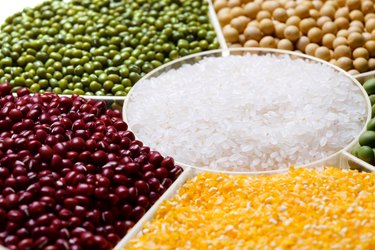
Dietary fiber, although mostly indigestible within your body, plays a crucial role in maintaining different aspects of your overall health. It's a type of carbohydrate found in plant foods that helps maintain proper digestion, cholesterol levels and body weight. Many high-protein, low-carbohydrate diets that limit foods such as whole grains lack adequate fiber. You may also lack fiber in your diet if you eat mostly processed and refined carbohydrates, such as white bread, regular pasta and snack foods.
Adequate Fiber Intake
Video of the Day
The Institute of Medicine recommends that men under 50 years old get at least 38 grams of fiber per day, men over 50 get at least 30 grams of fiber, women under 50 get at least 25 grams of fiber and women over 50 get at least 21 grams of fiber per day. To increase your fiber intake, eat more whole plant foods, such as the whole-grain brown rice, oatmeal and quinoa, fruits, vegetables, legumes, nuts and seeds.
Video of the Day
Irregular Digestion
If you have an extensive magazine selection in your bathroom due to the time you spend waiting for a bowel movement, you're likely constipated. It occurs when you have fewer than three bowel movements per week or when you have difficulty or pain having a bowel movement. A lack of dietary fiber may cause constipation. Fiber absorbs water and swells, providing bulk inside your digestive tract. This helps to keep everything soft and moving easily through your body. Be sure to drink plenty of fluids when increasing your fiber intake; otherwise, constipation may become worse.
Elevated Cholesterol
If you don't eat enough fiber, you may also develop an elevated cholesterol level. During digestion, your body secretes bile acids, which contain cholesterol from your body. Normally, a portion of this cholesterol gets reabsorbed into your body along with nutrients from food. When dietary fiber is present in your intestines, however, it binds to bile acids and removes them, and the cholesterol they contain, from your body in waste. Increasing your fiber intake and lowering your saturated fat and cholesterol intake can help to lower high cholesterol.
Weight Gain
A low-fiber diet may also contribute to weight gain. Because fiber swells, it provides a feeling of fullness when you eat. The longer you feel satisfied after eating, the less likely you are to overeat. According to the University of Arizona Cooperative Extension, fiber-rich foods also take longer to chew, meaning you may eat less food per meal. In addition, high-fiber foods, such as fruits and vegetables, tend to be high in water content and low in calories. By increasing your fiber intake, you may have an easier time maintaining or losing weight.
Chronic Disease
According to the National Cancer Institute, eating a diet high in fiber may play a role in preventing colorectal cancer. These benefits might come from the positive impact fiber has in digestion. Many fiber-rich foods provide a good source of antioxidants, which protect your body from damage by harmful free radicals. Harvard School of Public Health notes that a diet rich in fruits and vegetables, which are high-fiber foods, is linked to lower cancer rates. High-fiber foods also supply you with vitamins and minerals needed to keep your immune system at its best.
- Institute of Medicine: Dietary Reference Intakes for Energy, Carbohydrate, Fiber, Fat, Fatty Acids, Cholesterol, Protein and Amino Acids
- University of Arizona Cooperative Extenstion: Dietary Fiber
- University of California, San Francisco, Medical Center: Constipation
- MedlinePlus: Constipation
- National Cancer Institute: Colorectal Cancer Prevention
- Harvard School of Public Health: Vegetables and Fruits: Get Plenty Every Day